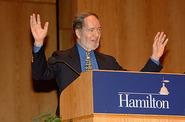
Jared Diamond, author of the Pulitzer Prize-winning Guns, Germs, and Steel, gave the James S. Plant lecture at Hamilton College on September 29 as part of the Science Center dedication weekend, "A Celebration of Science." The James S. Plant Distinguished Scientist Lecture series was established in 1987 through a bequest from Dr. Plant, class of 1912 and an eminent child psychiatrist, to bring to the campus outstanding scientists as guest lecturers. Diamond's lecture topic was a discussion of his new book, the New York Times best-seller Collapse.
"It's nice to be at Hamilton on the occasion of the opening of the new Science Center," Diamond told a standing room only crowd at Wellin Hall at the beginning of his speech. He went on to discuss what science is, exactly, and why it is so important to understand. "Science consists of knowledge and explanation of the real word," said Diamond.
Collapse looks at the failure or successes of past societies in terms of scientific factors and applies them to modern societies. "The understanding of science is key to the success of modern society," said Diamond, who went on to note how the United States is at an "awkward stage" as far as science is concerned. The current government is less receptive to science than any in the recent past, and currently there are debates over whether evolution or "intelligent design" should be taught in schools.
Diamond went on to discuss his scientific approach to understanding societies used in his book. He gave examples of past failed societies, such as the Mayan civilization, and successful societies, such as people of Iceland managing such a fragile environment. Diamond said that during his research, he decided that it was not enough to only discuss past societies that failed "when modern societies are suffering from the same things."
Diamond gave a "five-point framework" for the success or failure of a society. The five points are human environmental impact, in which humans may or may not exploit the environment in a way that will destroy the environment; climate and climate change, which can be human-induced (as in global warming) or for natural reasons; enemies, which can fall even a great society such as the Western Roman Empire if it is weakened by other problems, such as environmental ones; relations with trade partners, in which the collapse of one society can cause the collapse of another, dependent society; and how a society deals with its combination of economic and political issues.
The concrete example Diamond gave of a failed society for some of the above reasons was Easter Island. When Europeans arrived at Easter Island, there were no trees; but there were giant statues. This raised the question, how were they built? When the Polynesians arrived there around 800 A.D., there was a lush forest, and the society was built up around the use of trees for building canoes to fish for food and other necessary things. Around 1680, all of the trees had been cut down, and there was no way to build canoes to fish; this led to an epidemic of cannibalism, which quickly destroyed the entire society of Easter Island, leaving only their statues. Diamond cited this example as a "purely environmental collapse."
"Why does a society make a bad decision? Why did the person on Easter Island cut down the last tree? For all the same reasons we as individuals make bad decisions," said Diamond. There are three main reasons for a bad decision, according to Diamond: that a society may not anticipate a problem, that a society may not perceive a problem right away, and that when we do perceive a problem, we may not try to solve it (for example, some groups who benefit from the burning of fossil fuels are opposed to some plans to decrease global warming).
Diamond then explained the risks we face as a society, and what we can learn from past successful and failed societies. He cited the role of the elite as a factor that can endanger societies. "What distinguished successes from failures is that the failures tended to be those in which the elite insulate themselves from the rest of society," said Diamond. When the elite insulates itself, it can take care of its immediate needs without feeling the negative effects of other factors on the rest of the society. Diamond described the United States as acting as a gated community, where we act like we can uphold our heightened standard of living while many other societies suffer.
Another factor that contributed to failure or success of a society was the willingness to re-appraise values. The two values Diamond said the United States must re-appraise are isolationism and consumerism. "The oceans can no longer protect us," he said of our isolationist mindset.
Diamond closed by saying that our situation is more difficult in some ways but also more optimistic in some ways than past failed societies. It is riskier because there are many, many more people in our societies, there is a very rapid rate of environmental destruction, and, because of globalization, one collapsed society affects many. However, we have some tools societies of the past did not have to help our societies be successful.
Because of our technology, "We have the possibility of learning from countries remote from us in space," said Diamond. We also have scientists. "We have archaeologists, geologists, and paleontologists who can tell us what happened [in the past]; we have the unique opportunity to learn from past societies," Diamond concluded.
-- by Laura Trubiano '07
Posted September 30, 2005
